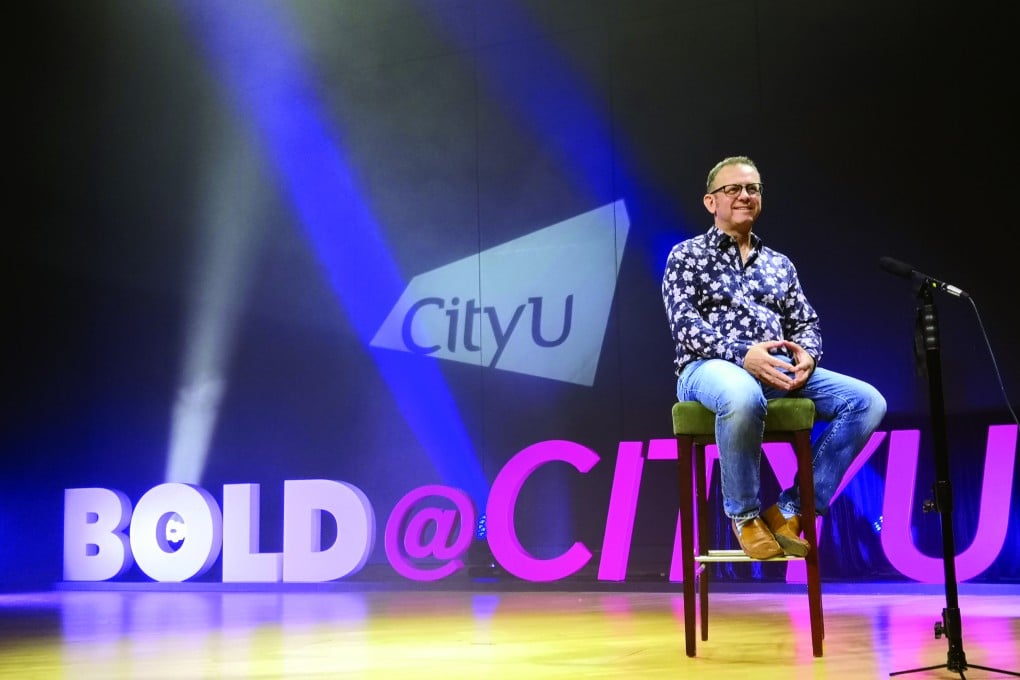Rethinking the Roles of Social Scientists and Humanities Experts
Professor Richard M WALKER speaks at CityU’s BOLD Forum and offers an inspiring vision of how humanities and social sciences can help create a better tomorrow

[Sponsored Article]
Academics in humanities and social sciences shape the way to tackle societal problems and make positive impact on society, so said Professor Richard M WALKER, Dean of CityU’s College of Liberal Arts and Social Sciences and recently elected Fellow of the Academy of Social Sciences in the United Kingdom.
As the title suggests, the sharing focuses on how humanities and social sciences combat social, political and natural disturbances, like those we have been facing since last year. To Walker, humanities and social sciences matters in the course of understanding the world, society and communities we live in. “To understand the world, we need to understand people. We need to understand the relationship between people and institutions, in order to understand how processes in the world operate,” he stated. Involving systematic studies in disciplines like communications, history, linguistics, literature, politics, sociology, and psychology, these two broader areas of knowledge explain how people interact with each other. This understanding is crucial as it helps make better decisions now and in the future.
Learn from the Past and Present for a Better Future
This interpretation may sound abstract to the audience, so Walker illustrated his views with an issue that probably everyone cares about most at the moment: the COVID-19 pandemic. Its scale is unprecedented, and its influences on norms and people’s behaviour are massive. Everyone is looking to put an end to the outbreak.
In the course of fighting the disease, people pay tribute to healthcare workers for looking after the patients day and night, and depend upon scientists and medical experts for discovering effective testing and treatment approaches and inventing vaccines. While recognising the efforts these professionals have made, Walker opined that experts in humanities and social sciences also play a key role in this battle.
They shed light on many questions and doubts in our mind. Some CLASS faculty members, for example, query why some places handled the crisis better than others, and are providing explanations by studying the reactions of different healthcare systems. Witnessing rumours spread like wildfire on the Internet and hinder the dissemination of useful precautious information, communication specialists here are looking for ways to communicate the urgency and severity of the pandemic to the public and investigating the impacts of social networking sites and instant messaging. In response to the deteriorating mental health situation amid the pandemic, our psychology experts draw on the results of their research studies conducted after the 2003 SARS outbreak and provide practical recommendations. Language educators are providing training for clinicians and nurses on shift-to-shift handover for better patient care.
As the research studies on COVID-19 and health related topics continue at CLASS, the list of questions and answers will get more exhaustive.
Multifaceted Issues Require Multidimensional Responses
The present crisis also exemplifies that most issues in today’s increasingly complex world are multifaceted and require people to view critically from diverse perspectives. The multidisciplinary training and collaborations, which Walker values a lot and is determined to cultivate in CLASS, are crucial. In fact, the faculty members are continuously working with experts in law, veterinary science, data science and other subjects in many ongoing research initiatives.
Indeed, the pandemic is just one of the countless issues that human beings need to tackle. But challenges mean opportunities, and the College’s social scientists and humanities experts are all ready to strike for the advancement of the world by building new knowledge, engaging in community service, and involving in academic, professional and policy-related debates. As Walker concluded in the talk, “By looking into how to resolve complex human-based problems and making recommendations on how societies can be better, the research conducted in the College can have positive impact on society.”
International Recognition of Social Scientist’s Contribution
Walker, who recently received the Fellowship of the Academy of Social Sciences in the UK, himself has demonstrated how a social scientist can make substantial contributions within and beyond academia. As an internationally acclaimed expert whose research interests range from public management and performance, citizen-government relationship to understanding human behaviour in the policy process, he has published numerous high-standing and award-winning works throughout his academic career. He has held editorships in some prominent public administration journals and consulted for APEC, OCED, UNDP and governments in Hong Kong and the UK. He also leads the Laboratory for Public Management and Policy at CityU, which seeks to enhance the performance of public services using rigorous research.
But he believes the award of the fellowship means more than his own achievement; it reflects the growing strength in the social sciences at CityU. “It will open up further opportunities to build upon the extensive international collaborative relationships within the College to drive social science research at CityU to the next level,” he said.
Let’s see how the academics in humanities and social sciences, those of CLASS included, play a part in changing the world—little by little.